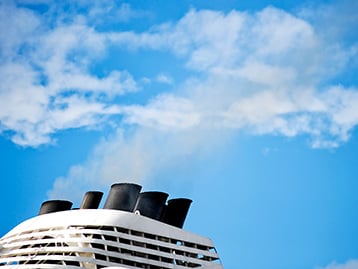Ban on discharge of water from open loop EGCSS in coastal waters of the north-west Europe from 1 July 2027
The 16 OSPAR contracting parties have agreed to phase out discharge from EGCSs in coastal waters of the European north-east Atlantic. Restrictions on open loop discharge are to take effect from 1 July 2027, and closed loop discharge from 1 July 2029. Read more about the ban in this news and on what to consider if EGCSs are an essential part of your SOx emissions compliance strategy.
Relevant for ship owners and managers as well as suppliers.
What has been agreed by OSPAR?
OSPAR is the Convention for the Protection of the Marine Environment of the North-East Atlantic, and it is the mechanism by which 15 governments and the EU cooperate to protect
the marine environment of the region. The OSPAR contracting parties are Belgium, Denmark, Finland, France, Germany, Iceland, Ireland, Luxembourg, the Netherlands, Norway, Portugal, Spain, Sweden, Switzerland, the UK and the EU.
Shipping is under growing scrutiny for the environmental impact of vessel discharge water from Exhaust Gas Cleaning Systems (EGCSs). The discharge of wash water from EGCSs shall be banned in inland waters and port areas of OSPAR member states, following the road map below:
- 1 July 2027: ban on open loop discharge
- 1 July 2029: ban on all discharge.
Contracting parties can delay the implementation by three years. OSPAR further recommends extending the ban to the territorial waters (12 nm) in general, and, scheduled for 2027. A Working Group will review if this recommendation should be turned into a regulation mandatory to implement.
The OSPAR Convention covers the north-east Atlantic. An extension of the ban to include the Mediterranean Sea will be up to Spain and France to decide. Denmark, Finland and Sweden have already enacted discharge regulations starting on 1 July 2025 from open-loop scrubbers covering their territorial waters (12 nm), which also include the Baltic Sea.
How to comply in OSPAR ports?
Ships that can operate their EGCS in zero-discharge mode should not have any issues with the upcoming ban on
discharge water. However, holding tank capacity may limit operational flexibility for many ships.
Ships equipped with an open loop or hybrid EGCS without any holding tank capacity should plan for a zero-discharge upgrade ahead of the relevant compliance deadlines. If upgrading to a more advanced hybrid or zero-discharge configuration is not feasible, switching over to compliant fuel while in port areas remains the only viable compliance option.
Statutory re-approval of modified EGCSs
Any modification to an approved EGCS requires amendments and approval of the relevant statutory documents and, where applicable, MED certification. Since conversion
to hybrid mode affects system performance in terms of both air and water emissions, the latest scrubber guideline – MEPC.340(77), effective from 1 June 2022 – should be applied for statutory re-approval. Considering the significant changes introduced in this guideline compared to earlier revisions, upgrading older EGCSs to hybrid mode may also
require additional system updates, including revisions of all related statutory documentation. Please see the DNV news on Update to the 2021 Guidelines for Exhaust Gas Cleaning Systems (“Scrubber Guideline”) for major differences between MEPC.259(68) and MEPC.340(77).
Change of manufacturer
There may be several reasons for engaging a different company to carry out a scrubber modification project than the one that originally designed and installed the EGCS. As much as this scenario is possible from the perspective of statutory approval, it has some consequences, especially considering document approval and MED certification:
- If alteration approval follows the same scrubber guideline as the initial approval, revising the entire set of statutory documents may be avoided by preparing expressive addendums to the original document. If the EGCS needs to be re-approved according to MEPC.340(77), all statutory documents need to be revised by the manufacturer in charge and submitted for approval.
- For installations subject to MED certification, a new application needs to be submitted. MED regulations only allow one single applicant for a complete EGCS. Consequently, the new applicant is taking over legal responsibility for the entire modified system. MED certification is usually applied for by the EGCS maker, who also needs to issue an EU Declaration of Conformity confirming fulfilment of the requirements relating to the product.
Recommendations
Shipowners with vessels trading in the north-east Atlantic and relying on open loop scrubbers for SOx emissions compliance should prepare for stricter discharge water regulations. In addition to switching to compliant fuel, upgrading to a hybrid scrubber system with a zero-discharge option could offer a practical alternative. Ensure that your modified system complies with the latest revision of the scrubber guidelines, MEPC.340(77).
References
- OSPAR press release: Press_release_ospar_ministerial_meeting2025_outcomes.pdf
- DNV Technical and Regulatory News no. 11/2022 – statutory: Updates to the 2021 Guidelines for Exhaust Gas Cleaning Systems (“Scrubber Guideline”)
- MEPC.259(68) 2015 Guidelines for Exhaust Gas Cleaning Systems: MEPC.259(68).pdf
- MEPC.340(77) 2021 Guidelines for Exhaust Gas Cleaning Systems: MEPC 77-16-Add.1 – Report Of The Marine Environment Protection Committee On Its Seventy-Seventh Session (Secretariat).pdf
Contact
- For customers:
DATE - Direct Access to Technical Experts via My Services on Veracity. - Otherwise:
Use our office locator to find the nearest DNV office.
